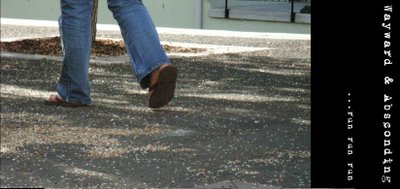
This week I've been reflecting back on the end of a project in the Southern Highlands of NSW called
Wayward & Absconding. The project was a partnership between PACT Youth Theatre in Sydney and the Wingecarribee Shire Council and involved the five members of the performance collective falling32 (of which I'm a part) working with young people from the Wingecarribee Shire (the Mittagong/Bowral/Moss Vale area) over ten Saturdays to create a public performance.
Only seven participants from the area committed to the whole process and so, having expected a larger turn out, we were initially disappointed. But, the privilege of working with a small and enthusiastic group soon overcame that. As facilitators we offered a process of making performance based on games, together with physical and textual improvisation. Thematically we worked with contemporary and historical experiences of being a young person in the area. There was naturally a degree of negotiation involved in the process as we attempted to explain and demonstrate the value of our approach to making performance, but the participants increasingly engaged with us and the material with eagerness, enthusiasm and generosity.
A few observations from this process have remained with me: Firstly, I've learnt that where performance is involved (and you could extend this into other spheres too) people's first and relatively spontaneous reactions to stimuli and situations are often the most engaging, interesting and honest. Given the opportunity to premeditate their actions, the desire to fit in and produce a socially appropriate (ie: funny/insightful) response seemed to lead to predictability and cliche. Given that we were working with teenaged participants, this was an issue. Much of the process involved stripping back the offers the participants made, asking them to do less and to commit to the actions and tasks that each exercise demanded rather than to worry about
performing.
Secondly, the practical experience of being involved in 'youth theatre' has also convinced me of its value. Allowing the participants to express and articulate their concerns within the context of the work gave them such a sense of agency. Teaching them performance skills and encouraging them in their efforts led to a growth of confidence amongs many of the individuals. As a group they developed a real solidarity and a pride in what they were putting together. I could also see the benefit to the participants of having people a few years older than they take time to provide them with skills, attention and encouragement.
The final performance took place outdoors on Sunday evening. 70 people attended and the performers guided them through a plaza outside the Bowral Library, negotiating the hedges, trees, broad steps and narrow passageways of the site.
